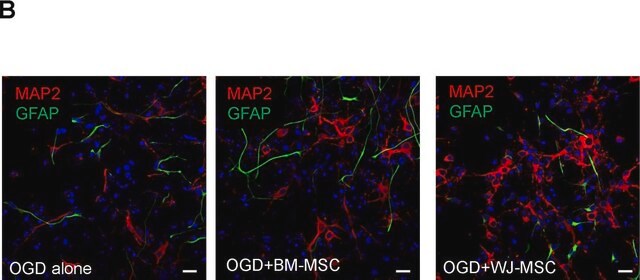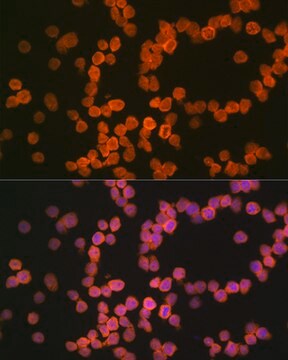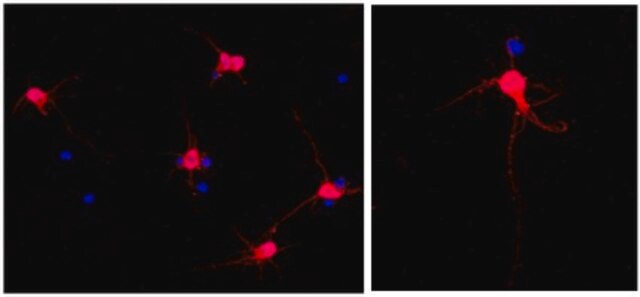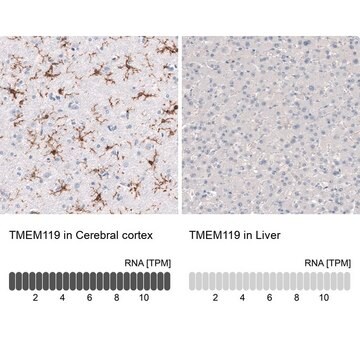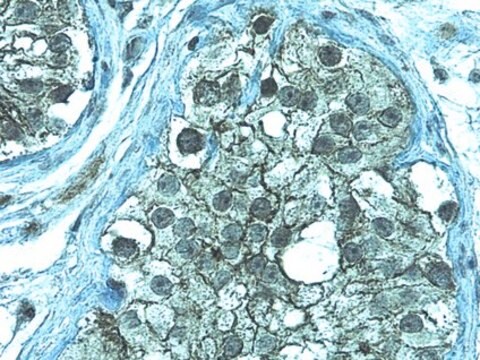추천 제품
생물학적 소스
mouse
Quality Level
항체 형태
purified antibody
항체 생산 유형
primary antibodies
클론
12E3, monoclonal
정제법
affinity chromatography
종 반응성
human, mouse
종 반응성(상동성에 의해 예측)
rat
포장
antibody small pack of 100
기술
ELISA: suitable
flow cytometry: suitable
immunoprecipitation (IP): suitable
western blot: suitable
동형
IgMκ
에피토프 서열
Unknown
단백질 ID 수납 번호
UniProt 수납 번호
저장 온도
-10 to -25°C
특이성
Clone 12E3 is a mouse monoclonal antibody that detects poly-N-Acetylneuraminic acid (Neu5Ac).
면역원
Splenocytes from mouse injected with forebrain region of E18 rat embryo.
애플리케이션
Quality Control Testing
Evaluated by Western Blotting in one day old Mouse brain tissue extract.
Western Blotting Analysis: A 1:1,000 dilution of this antibody detected Poly-Neu5Ac in one day old Mouse brain tissue extract.
Tested Applications
Flow Cytometry Analysis: A representative lot detected Poly-Neu5Ac in Flow Cytometry applications (Davies, L.R.L., et al. (2012). J Biol Chem. 287(34):28917-31).
Western Blotting Analysis: A representative lot detected Neu5Ac in Western Blotting applications (Yabe, U., et al. (2003). J Biol Chem. 278(16):13875-80; Naito-Matsui, Y., et al. (2017). J Biol Chem. 292(7):2557-2570).
Immunoprecipitation Analysis: A representative lot detected Neu5Ac in Immunoprecipitation applications (Yabe, U., et al. (2003). J Biol Chem. 278(16):13875-80).
ELISA Analysis: A representative lot detected Neu5Ac in ELISA applications (Sato, C., et al. (1995). J Biol Chem. 270(32):18923-8).
Note: Actual optimal working dilutions must be determined by end user as specimens, and experimental conditions may vary with the end user.
Evaluated by Western Blotting in one day old Mouse brain tissue extract.
Western Blotting Analysis: A 1:1,000 dilution of this antibody detected Poly-Neu5Ac in one day old Mouse brain tissue extract.
Tested Applications
Flow Cytometry Analysis: A representative lot detected Poly-Neu5Ac in Flow Cytometry applications (Davies, L.R.L., et al. (2012). J Biol Chem. 287(34):28917-31).
Western Blotting Analysis: A representative lot detected Neu5Ac in Western Blotting applications (Yabe, U., et al. (2003). J Biol Chem. 278(16):13875-80; Naito-Matsui, Y., et al. (2017). J Biol Chem. 292(7):2557-2570).
Immunoprecipitation Analysis: A representative lot detected Neu5Ac in Immunoprecipitation applications (Yabe, U., et al. (2003). J Biol Chem. 278(16):13875-80).
ELISA Analysis: A representative lot detected Neu5Ac in ELISA applications (Sato, C., et al. (1995). J Biol Chem. 270(32):18923-8).
Note: Actual optimal working dilutions must be determined by end user as specimens, and experimental conditions may vary with the end user.
표적 설명
Cell surface of vertebrate cells contains a dense layer of glycans that often terminate with sialic acids, mainly Neu5Ac or Neu5Gc that differ only by a single oxygen atom. Glycoproteins and proteoglycans containing these moieties provide a scaffold for cell-to-cell and cell to environment communication. These sialic acids are mainly present as monosialyl residues at the non-reducing terminus of glycoproteins and play a role in ligand-receptor interactions during fertilization, development, differentiation, and adult brain functions. However, occasionally, sialic acids are linked to each other to form a polymerized structure (poly-sia; poly-Neu5Ac) that can contain 8 to 200 sialyl residues. These glycans are not only modifications of core molecules that are helpful as markers on particular cells, but also have independent functions via their interactions with glycan-recognizing molecules, such as lectins. Neu5Ac is reported to be a prevalent on a variety of sialoglycoconjugates SGCs) in vertebrate brain tissue. Its homopolymeric form (Poly-Neu5Ac) is shown to be most prevalent on the neural cell adhesion molecule (NCAM) and in the capsules of certain neuroinvasive bacteria. NCAM with polymeric Neu5Ac is highly expressed during the embryonic and early postnatal development and plays a critical role in neurite outgrowth and neural plasticity. Poly-Neu5Ac also acts as a neurotropic factor in neuroinvasive E. coli K1 and Neisseria meningitidis serogroup B. The exact mechanisms for breakdown of polymeric forms is not well understood. However, it can undergo an intramolecular self-cleavage into short oligomers under prolonged mild acidic conditions found in lysosomes. Clone 12E3 is highly specific for detection of poly-Neu5Ac glycotype and do not display reactivity towards poly-Neu5Gc. Naito-Matsui, Y., et al. (2017). J. Biol. Chem. 292(7); 2557-2570; Davies, LRL., et al. (2012). J. Biol. Chem. 287(34); 28917-28931; Sato, C., et al. (1995). J. Biol. Chem. 270(32); 18923-18928).
물리적 형태
Purified mouse monoclonal antibody IgM in PBS without preservatives.
재구성
1.0 mg/mL. Please refer to guidance on suggested starting dilutions and/or titers per application and sample type.
저장 및 안정성
Store at -10°C to -25°C. Handling Recommendations: Upon receipt and prior to removing the cap, centrifuge the vial and gently mix the solution. Aliquot into microcentrifuge tubes and store at -20°C. Avoid repeated freeze/thaw cycles, which may damage IgG and affect product performance.
기타 정보
Concentration: Please refer to the Certificate of Analysis for the lot-specific concentration.
면책조항
Unless otherwise stated in our catalog or other company documentation accompanying the product(s), our products are intended for research use only and are not to be used for any other purpose, which includes but is not limited to, unauthorized commercial uses, in vitro diagnostic uses, ex vivo or in vivo therapeutic uses or any type of consumption or application to humans or animals.
적합한 제품을 찾을 수 없으신가요?
당사의 제품 선택기 도구.을(를) 시도해 보세요.
Storage Class Code
12 - Non Combustible Liquids
WGK
WGK 2
Flash Point (°F)
Not applicable
Flash Point (°C)
Not applicable
시험 성적서(COA)
제품의 로트/배치 번호를 입력하여 시험 성적서(COA)을 검색하십시오. 로트 및 배치 번호는 제품 라벨에 있는 ‘로트’ 또는 ‘배치’라는 용어 뒤에서 찾을 수 있습니다.
자사의 과학자팀은 생명 과학, 재료 과학, 화학 합성, 크로마토그래피, 분석 및 기타 많은 영역을 포함한 모든 과학 분야에 경험이 있습니다..
고객지원팀으로 연락바랍니다.